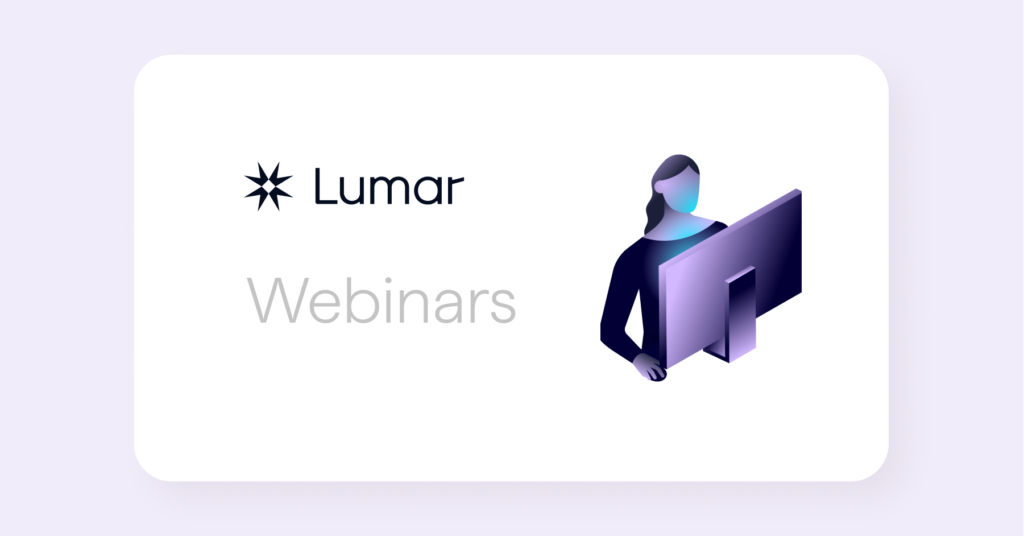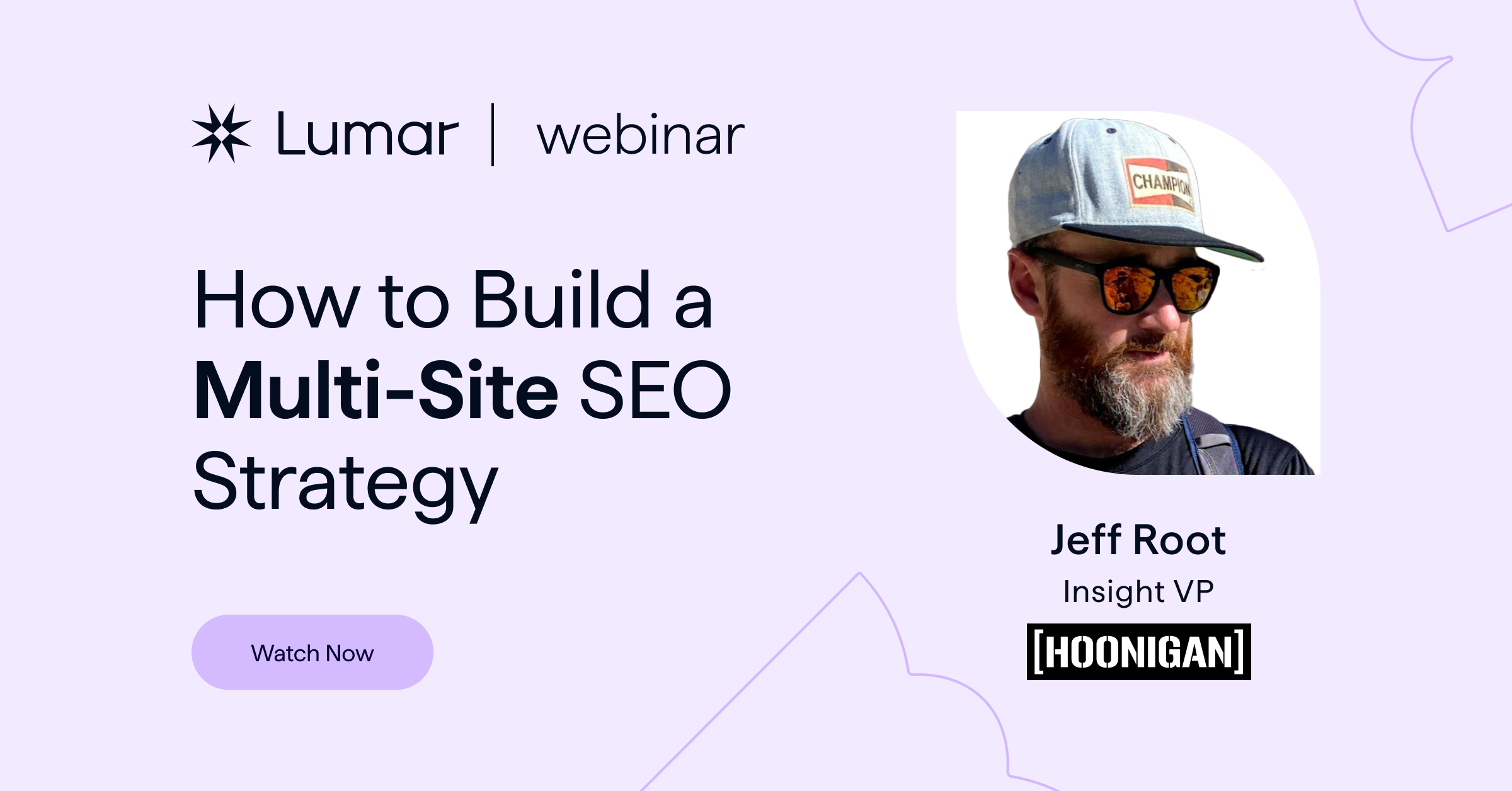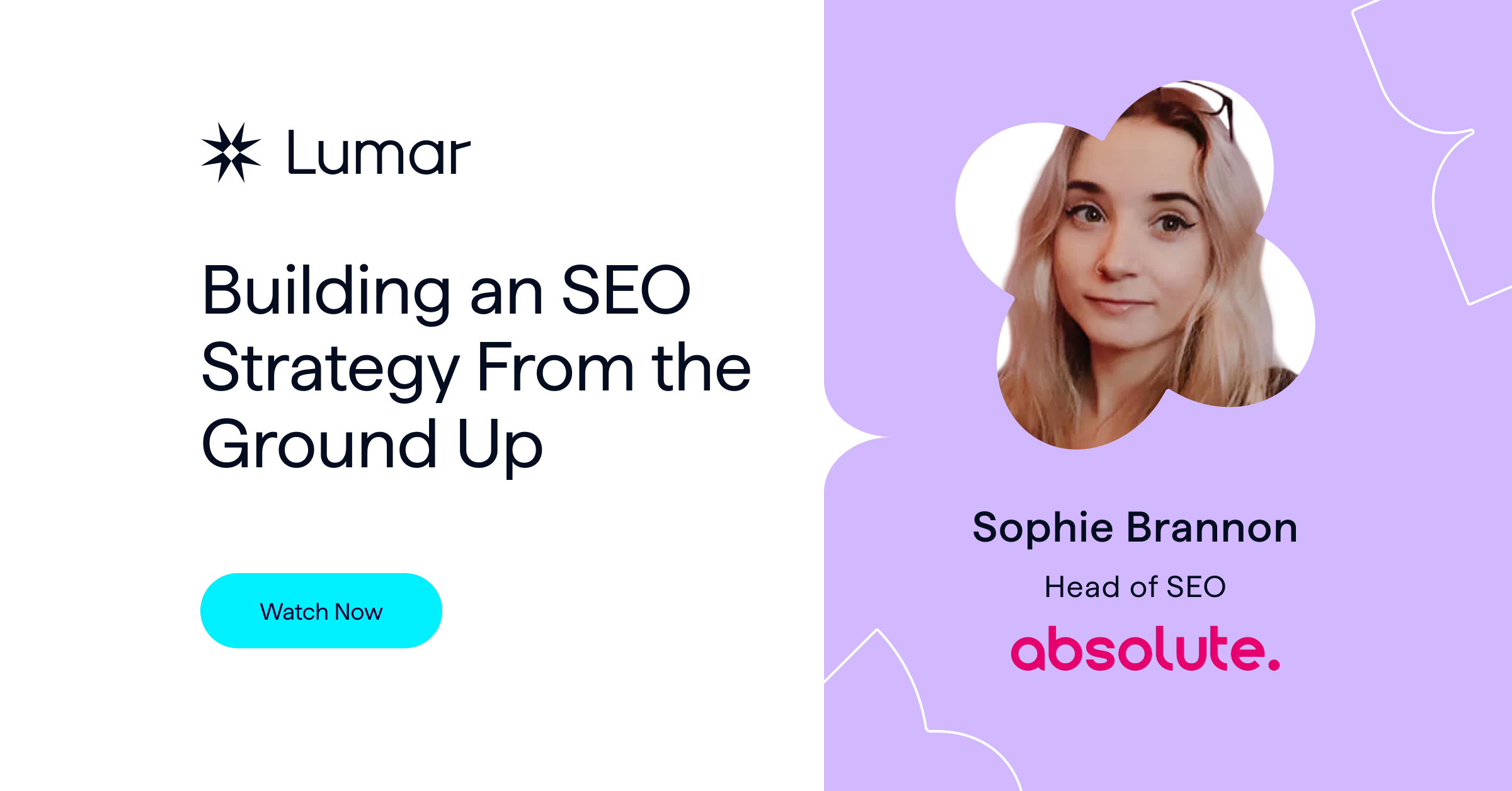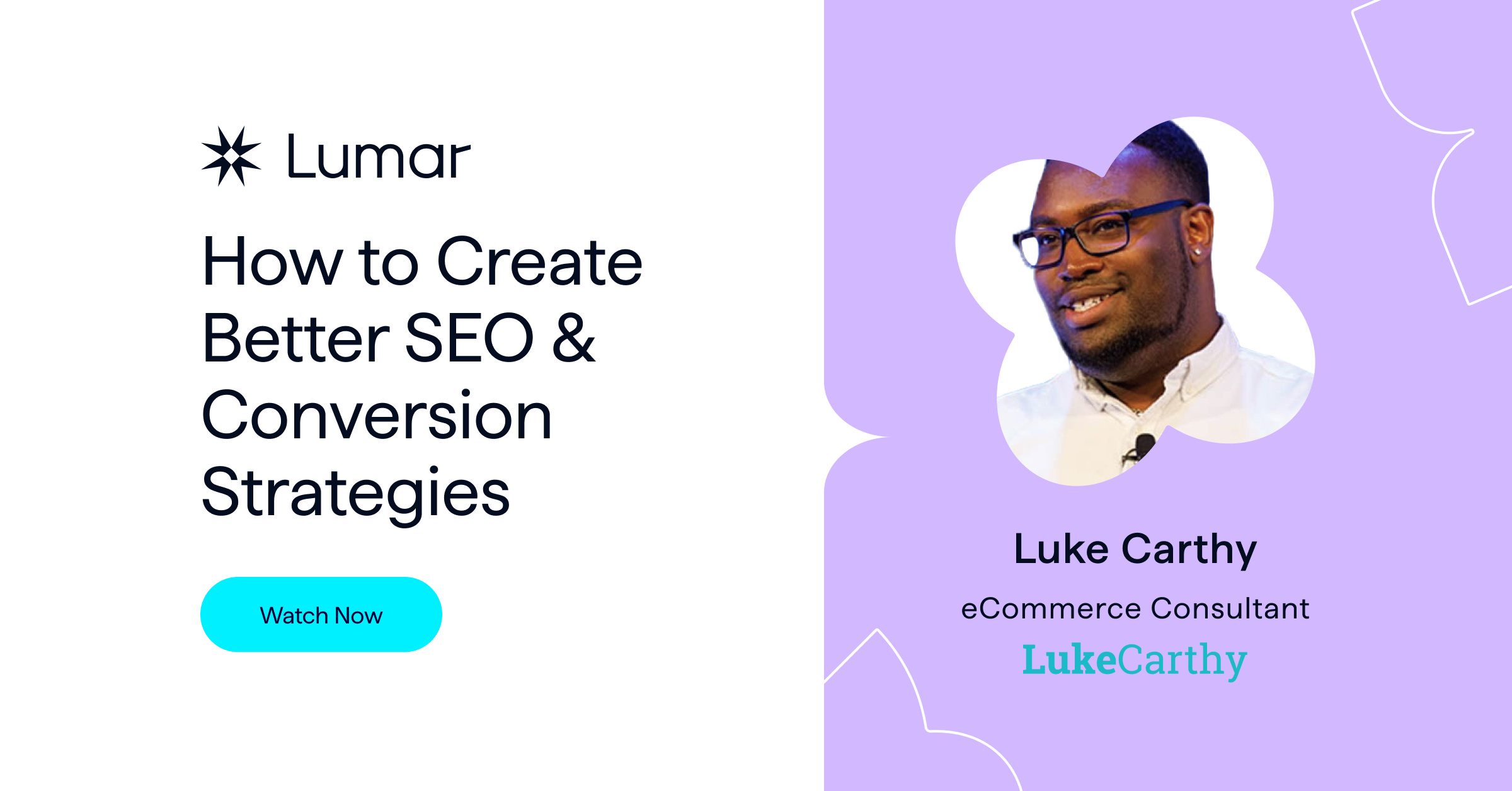This Wednesday, our Chief Growth Officer, Jon Myers, and Marketing Director of Majestic, Dixon Jones, took to a webinar to debate everything backlinks, in an event known as the Battle of the Backlinks.
If you couldn’t attend the webinar or would like to revisit some of the key points, then luckily for you we diligently took notes and collated them into this handy recap. We’ve also included a recorded version of the webinar so you can watch it all again!
A big thank you to Dixon for taking the time to share his expertise in this area of search! We learned SO much.
Thank you @JonDMyers and @Dixon_Jones for the #backlinkchat today. Loved the debate and information. Looking forward to more discussion in the future! also, thanks to @_JHoff for fielding Qs 😉
— Kyla Becker (@KylaBecker) November 22, 2017
A Brief Introduction to Backlinks
Jon began the proceedings by explaining the importance of backlinks and how this has always been the case for search engines.
Jon: We’ve always talked for years about backlinks, they’re the currency of the web and drive a lot of signals for Google to perceive.
Then Dixon ran us through his presentation, entitled “Link Building to Improve Your Search Visibility.” You’ll be able to see all the slides as Dixon talks through them in the webinar recording above.
Do Links Still Matter?
Dixon started with a reference to our previous webinar guest, Eric Enge from Stone Temple Consulting and looked at an original research-heavy study Eric had published on whether or not links are still a powerful ranking factor. The study received great engagement and concluded that backlinks are still a big ranking factor.
He also went on to reference how Yandex previously tried to stop having backlinks as a ranking factor, and how he’s spoken to Googlers who had tested not using links. Results for both of these tests…“went to pot.”
Consensus? Links absolutely do still matter in the world of SEO.
Opinions on Backlinks & PageRank, from Google Themselves
Dixon: Google do, themselves, occasionally make it obvious that links are an important ranking factor.
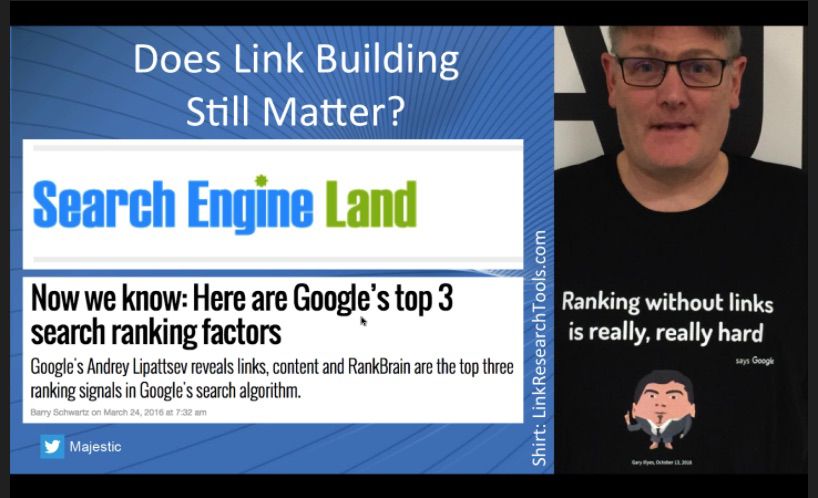
Not only are backlinks still key, but the PageRank algorithm is still alive and kicking. Just ask Gary Illyes.
DYK that after 18 years we’re still using PageRank (and 100s of other signals) in ranking?
Wanna know how it works?https://t.co/CfOlxGauGF pic.twitter.com/3YJeNbXLml
— Gary “鯨理” Illyes (@methode) February 9, 2017
Dixon: The PageRank algorithm is not dead. I think a lot of people say it is because you can’t get it online anymore and you can’t see it. That doesn’t mean it’s out of the algorithm, the PageRank algorithm is really powerful.
Confirmed! “Having spoken with @methode it’s clear, #Google is still using the #pagerank algorithm” –@Dixon_Jones laying down the #Backlinks law in our webinar here: https://t.co/Hm8beOyQdC pic.twitter.com/y4WbHNZvEF
— DeepCrawl (@DeepCrawl) November 22, 2017
The Power of Links
Dixon: If you really think about links, there are only two ways of getting to a website. Either you type in “www.deepcrawl.com” into your browser, or you click on a link.
To delve into how people engage with content through linking vs sharing, Majestic teamed up with the influencer tool, Buzzsumo, to do some research.
Dixon: If you’re not going to build links then you’re probably going to build shares to try and promote your brand.
Here are the main takeaways from the research findings by Majestic and Buzzsumo.
Why do people share content?
- Because it’s entertaining or resonates with our ideals and interests
- To nourish relationships and speak to our social media “tribe”
- Passion (right brain activity)
Why do people link to content?
- Because it provides facts and data and supports our arguments
- Because it’s authoritative, in-depth and will stand the test of time
- Rational (left brain activity)
Thanks for the Battle of the Backlinks webinar @JonDMyers@DeepCrawl@Dixon_Jones@Majestic ! Interesting way of thinking about forces that drive people to share content vs linking to it: we link with logic (left brain) and share with passion (right brain) pic.twitter.com/2Ib3aV1LIq
— Rachel Costello (@rachellcostello) November 22, 2017
How Many Links is Enough?
Dixon: This question goes right to the heart of the PageRank algorithm. Links have wildly different strengths. The strength comes from the brand equity of the page behind the link. This really messes up the argument of how many – it’s not a case of how many, it’s a case of have you got the right ones.
For @Dixon_Jones#pagerank is an iterative process, making the ‘how many links is enough’ question slippery. It could be one or could be none! Happy to hear Dixon empathises with us about this age old #SEO question. You can still jump into our webinar: https://t.co/Hm8beOyQdCpic.twitter.com/9IUC5CVFsh
— DeepCrawl (@DeepCrawl) November 22, 2017
Dixon: Internal links affect the strength of a web page particularly in the PageRank algorithm. Not only are all the different pages of your website different strengths, but those pages can be influenced by the internal link structure of the website as well.
We had a live Twitter debate during the webinar about internal links which you can take a look at here.
How do you estimate page strength, you ask? Enter Majestic Trust Flow and Citation Flow! The algorithms behind how these metrics are calculated are inspired by the one and only PageRank, and the idea of how pages linking to one another in progression causes change.
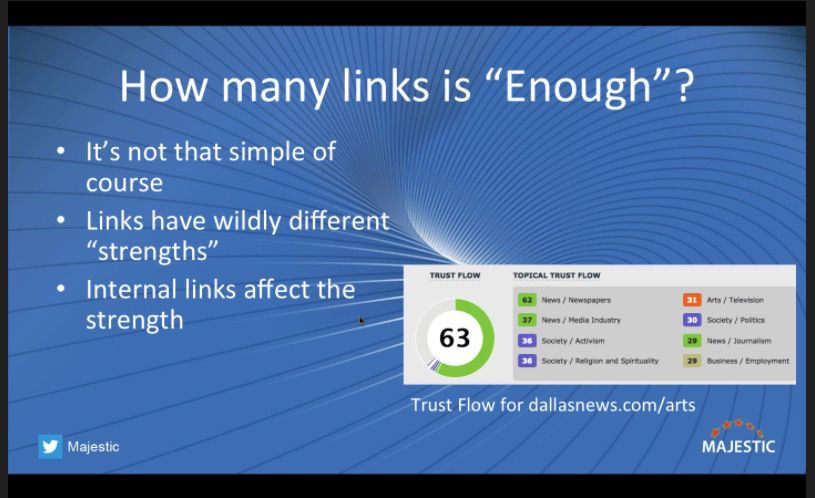
Dixon then shared this visual example of how the PageRank algorithm works. Despite more links pointing into B, A will ultimately be a more influential page because the influence of each linking page passes through to the next in a chain.
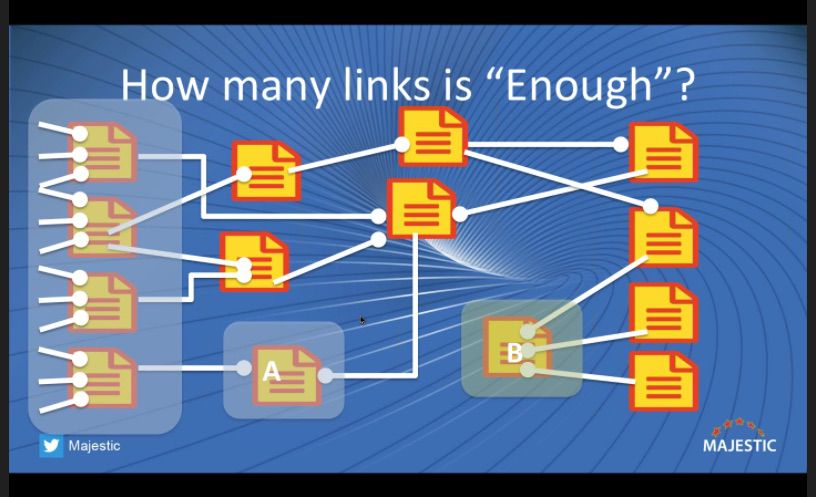
Dixon: PageRank is what I’d call an iterative decay algorithm.
Dixon: So how many links is enough? You could say one, because all you need is internal links to the page and it could still rank.
Dixon: There’s only so much link juice to go round. Internal links should be well focused towards important pages.
7 Super Practical Examples of Link Building
Dixon lists seven good link tactics that are usable and understandable.
- The Really Low Hanging Fruit (404s): Redirect backlinks that 404
- The Internal Link Tricks: Find underperforming pages that should rank and link to them internally
- Original Insights & Research: People are much more willing to link to original content and research that are accessible
- Reference-able Content: Content that is so in-depth people won’t copy it and will link to it instead, but you will need to have authority/influence
- Authoritative Content: Content that carries weight, authority and brand equity is more trusted and linked to
- Valuable Content: Create a valuable resource that is thorough and backed up with knowledge e.g. Danny Sullivan’s Google RankBrain article
- Data-Driven Content: You can’t put out the same data in the same way and expect links, unless you are an authority in the industry
Looking for #linkbuilding tips? Here are @Dixon_Jones from @Majestic‘s top tips from our live #backlink webinar so far. pic.twitter.com/vEnYKdnwzf
— DeepCrawl (@DeepCrawl) November 22, 2017
You also need to make sure you prep the launch carefully: it’s not just about the content but how you get the content out, and in the right way.
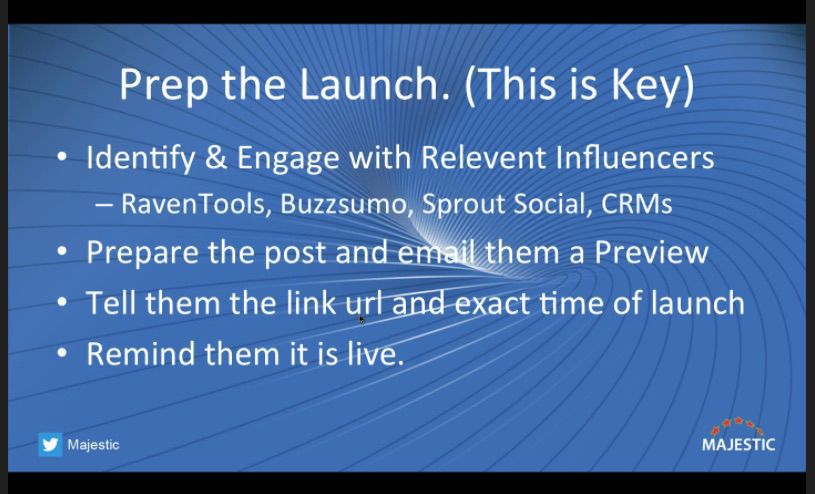
What angle will you take for your next post to get links? Try one of the following as Dixon recommends:
- Controversial
- Authoritative
- Reference-able
- New facts
- Data-driven
- Valuable
So there you have it, links do indeed still matter!
Q&A Session: What We Learned
If we haven’t given you enough already, here are some key takeaways from the Q&A session at the end of the webinar.
Dixon: For PageRank, as well as Trust Flow and Citation Flow, the calculation is always done at page level and not at the domain level. Yes, link juice does pass through, but people have a tendency to think about domain authority which is not a concept that was in the original algorithm.
@Dixon_Jones jones believes that page rank math is worked out at page level not domain level so putting content on subdomains does not really matter for backlinks.
Feels right.@DeepCrawl backlinks webinar
— Simon Cox (@simoncox) November 22, 2017
Dixon: I don’t think links will lose value when mobile-first rolls out. If you have a mobile experience the last thing you want to do is type in a website address. What you want to do is tap on something, so the need for links is even more important on mobile.
Jon: Google has said get a responsive site and don’t worry about it, I think that makes their route to mobile-first indexing a lot easier for them. They love their AMP pages, and it’s faster to get content on AMP pages indexed – it probably saves them quite a lot of legwork.
Dixon: I don’t think AMP pages will become preferential, you need to have enough catch up for a feature to have a positive ranking effect. I don’t think there are enough people who care enough about Google to make their pages AMP. It’s not at the top of a lot of people’s agendas, even if Google may want more AMP pages.
Dixon: The problem for social links is that they’re usually behind a walled garden away from Googlebot. That means Googlebot is unable to see everything on Facebook. That doesn’t mean these links aren’t valuable, but they are in what’s described as ‘the Dark Web.’ Your Twitter profile is visible to Googlebot so I would strongly recommend linking to your blog or company page on your profile.
Dixon: If you create a conversation that’s of value it pops out in different ways and Google picks up the signals.
Watch This Space…
As a final treat, Jon made the announcement that DeepCrawl are starting to ingest more and more Majestic data into the platform. We hope you’ll get a lot of value out of seeing data from DeepCrawl and Majestic together in one place.
